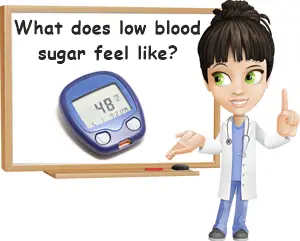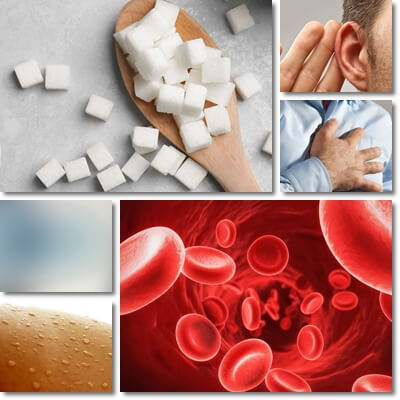You can experience low blood sugar without diabetes if you don’t eat for some time. Signs and symptoms of low blood sugar can vary from one person to another, and between men and women. The lower the levels of sugar in the blood, the more severe the symptoms. The fact that not everyone experiences low blood sugar the same way is actually perfectly normal. But what does low blood sugar feel like?
There are actually quite a few symptoms of low blood sugar levels. For some people it starts out with a feeling of extreme hunger, either physical hunger or specific cravings. Low blood sugar also commonly causes lightheadedness and dizziness, profuse sweating, fainting, cardiovascular symptoms and even panic attacks.

What does low blood sugar feel like?
1) Hunger
When your blood sugar levels drop below 70 milligrams of sugar per deciliter of blood (70 mg/dL), you start experiencing side effects. One of the first symptoms of low blood sugar is hunger. The hunger can be physical and felt in the stomach, not necessarily painful, or it can be psychological, in the form of food cravings. Food cravings can be vague, such as craving carbs or sweets, or quite specific, centered on particular food items such as pasta, chocolate, soda or fruit.
2) Dizziness
When your blood sugar levels drop too much, you may start to feel dizzy. Dizziness is normal in low blood sugar and a sign your body does not have enough fuel to run on. So it lets you know in sometimes alarming ways, such as dizziness. A lot of people experiencing low blood sugar for the first time get very concerned when they feel dizzy, not knowing it’s just their body’s way of letting them know they need to refuel to keep going.
3) Feeling irritable, angry and snapping at others
When you’re feeling hungry, you’re also sometimes feeling angry as a psychological response to hunger. But sometimes you don’t feel hungry, even if your body needs more fuel. But you may start to feel irritable and angry all of a sudden, and snap at others. This can be a sign your blood sugar has dropped and you need to eat asap.

4) Feeling overheated and sweating profusely
Sweating all of a sudden? Maybe you’re feeling a little dizzy too? Can you remember how long it’s been since you last ate something? If you are feeling overheated and start to sweat all of a sudden, without there being any apparent cause to it (high temperatures, having had a hot drink or having taking medication etc.), then you may want to consider low blood sugar, especially if you haven’t eaten anything in a while.
5) Cold sweats
Some people experience a sudden surge in body temperature and sweating as a result of their blood sugar dropping below normal levels. Others however may experience cold sweats which is a bodily response characterized by sweating and feeling cold or chilly at the same time. And it’s quite common.
6) Lightheadedness
Low blood sugar levels can cause you to feel lightheaded and experience a sort of a high. This is when you start to experience a whirling sensation and feeling like you might faint or fall.
7) Foggy thinking
Low blood sugar levels affect the brain and reduce the performance of cognitive functions such as thinking. How is that possible? Brain activity is fueled by sugar in the bloodstream. When levels of sugar in the blood drop below certain values, the brain no longer receives its fair share of fuel and that negatively impacts thinking. So if you haven’t eaten for a while and you’re feeling lightheaded, distracted and can’t seem to think clearly, then it might just be low blood sugar.
8) Your productivity drops
After not having eaten for some time, do you struggle to be attentive and perform even the simplest tasks? Do you feel distracted, disconnected, confused and lose the train of thought? It might just be a symptom of low blood sugar. Sugar from the blood stream is a source of food for the brain and fuels cognitive functions and productivity. Without a source of food, the brain no longer performs optimally and that causes thinking to feel hazy, clouded or blurred, impairs focus and leads to low productivity.
9) Palpitations, high heart rate (tachycardia)
A significant drop in blood sugar levels, below the normal value of 70 mg/dL, causes cardiovascular side effects and symptoms. More specifically, low blood sugar causes palpitations, the feeling of having a rapid and/or irregular heartbeat, as well as an abnormally high heart rate (tachycardia).
10) You feel weak, shaky, faint, or faint
If you are in a hypoglycemic state, you may feel weak, faint, or actually faint. This is meant to be a protective response through which the body seeks to preserve the little remaining fuel it has for basic life sustaining functions. Shaking is a sign fuel, aka blood sugar, is running too low. Most people don’t actually faint, but this is a possibility when blood sugar levels drop below a certain threshold. Also, fainting in blow blood sugar can be related to cardiovascular and psychological symptoms such as palpitations which trigger anxiety and cause a state of panic.
11) You feel nausea, or feel like you are about to vomit
If you haven’t eaten for a while and go into hypoglycemia, you may experience nausea or feel like you are about to vomit. This can also be caused by having an empty stomach and it’s a fairly common symptom.
12) Your ears start to ring, or everything goes quiet
These are symptoms of low blood sugar that can occur without being followed by other major events (aka fainting), or can precede fainting closely. In any case, know that it is possible to experience ringing ears at an almost deafening level, or sudden and temporary loss of hearing as a result of hypoglycemia.
13) Your vision turns white
You haven’t eaten for a while. Your blood sugar levels begin to drop. At one point, you start to experience cold sweating, become clammy and pale. You are feeling lightheaded, dizzy or weak. You may also feel nausea, but not enough to vomit. Your ears may start ringing or your hearing goes out. And then your vision turns white, bright white, and completely fades into white like an over exposed photo.
If you start to see a bright white light and your whole vision turns completely white, the first thing you need to do is sit or lie down to prevent falling and possible injury. Once you come out of it, have some water and eat something, preferably something sugared like some chocolate, candy or a sweet fruit or fruit juice, although almost anything will do. The point is to get your blood sugar levels up quickly.
14) Your vision turns black
A lot of people with low blood sugar experience symptoms such as white out vision with dizziness or lightheadedness. But not all. Some people report their vision turns black. The sudden black out in vision may be accompanied by other symptoms of low blood sugar such as lightheadedness, dizziness, foggy thinking, weakness, nausea, ringing ears or fainting. The black out can come and go, in a few seconds, without you actually fainting, but only losing your balance. Or it can be a total black out during which you can actually faint and fall.
15) Going in and out of consciousness
Even without diabetes, low blood sugar can cause a person to briefly lose consciousness, or faint. The black out may only last a couple of seconds, quickly followed by a return to consciousness. You can experience one episode, or several, one after the other. The important thing at this point is to raise your blood sugar levels quickly – have some sugar or honey, sugar or honey mixed in water, chocolate, fruit juice, anything with simple carbs that gets to your bloodstream in mere minutes. And see a doctor.
16) You get anxious
Low blood sugar often causes severe anxiety in those who have never experienced it before. It also becomes a trigger for existing anxiety in those who experience it frequently. Anxiety is often extremely difficult to manage since one episode begets another in a neverending cycle and repeated low blood sugar episodes end up becoming yet another reason for worry.
17) Low blood sugar can trigger panic attacks
You are more likely to experience anxiety and a panic attack if it’s the first time you are dealing with low blood sugar levels, or if you are already having regular panic attacks, in which case low blood sugar becomes a psychological trigger.
How do you know it was low blood sugar?
If what you have is low blood sugar without diabetes, you should start to regain your strength and clarity of through within minutes of having something sweet like plain table sugar, chocolate, fruit or fruit juices, or a tablespoon of honey. A few episodes are also acceptable, but if you experience low blood sugar too frequently and can’t seem to manage it, then it’s time to see your doctor for some tests to see whether or not you have diabetes or another underlying condition.
